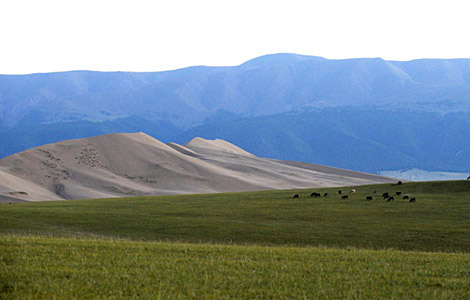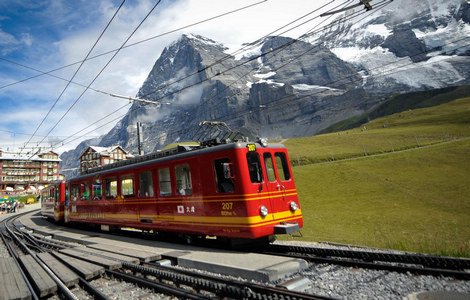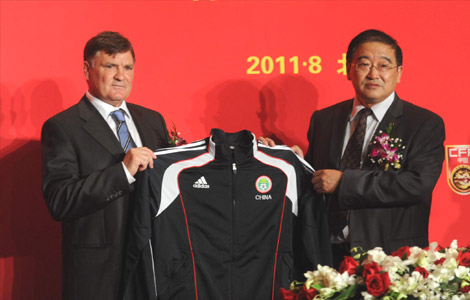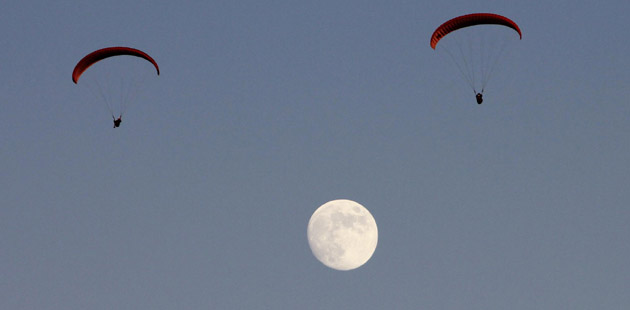Argentine primary to test president's clout
Updated: 2011-08-15 08:06
By Hugh Bronstein (China Daily)
|
|||||||||||
BUENOS AIRES, Argentina - Argentina's primary election on Sunday is expected to provide the clearest sign yet of whether President Cristina Fernandez will win a strong mandate in October to deepen her leftist policies.
Fernandez is expected to win a second term in the Oct 23 presidential election. But if she gets less than 40 percent of the primary vote, and if a strong challenger emerges to unite the opposition, the race could become more competitive.
The 58-year-old Peronist leader is popular, although she has infuriated farmers and grains exporters with interventionist policies meant to strengthen the hand of the state in Latin America's third-largest economy.
Wall Street criticizes Fernandez for imposing price controls, raiding central bank reserves to make debt payments and publishing inflation data that underestimate what private economists say is a real annual rate of over 20 percent.
She is nonetheless sure to be the biggest vote-getter on Sunday. The question is by how much and who will emerge as her main rival.
This is the first unified primary that Argentina has ever held. Participation is mandatory, but there was much uncertainty about how many voters would in fact turn out.
All political parties have already anointed presidential candidates - turning the primary into a dress rehearsal for October. It will essentially be a very expensive opinion poll.
Opinion polls have shown the president's support to be in the range of 40 percent to 50 percent. Neither of her top two competitors - Radical party lawmaker Ricardo Alfonsin and former Peronist President Eduardo Duhalde - gets more than 15 percent in most surveys.
Although the recent defeat of government-allied candidates in key provincial elections bruised her image of invincibility, the president's campaign is benefiting from strong economic growth driven in part by booming grain export revenues.
She says her second government will be dedicated to the memory of her late husband, Nestor Kirchner, who died last year. He preceded Fernandez as president and set the tone for many of her policies, which emphasize import substitution and subsidies for the poor.
Kirchner and Fernandez are credited by supporters with steering the country back toward prosperity after a devastating financial crisis in 2001 and 2002.
"As it turns out, we were right," Fernandez recently said in a comment aimed at Wall Street analysts who warned that her policies would lead to ruin. She promises to "deepen the model" of her government if she wins a second four-year term.
If Fernandez wins 40 percent or more of Sunday's vote it will reinforce the view that she can avoid a runoff election by winning office in October's first round.
Forty percent would be enough to win office in the first round, as long as Fernandez also holds a 10-point lead over the runner-up. She would win outright with 45 percent of the votes.
If Fernandez wins re-election by only a small margin, investors hope it might force her to rethink her policies and come up with an orthodox response to problems such as high inflation. The government currently fines economists who publish inflation estimates that it does not agree with.
"If she does not win convincingly in the primary, which means 40 percent or more, there will be a rally on Monday in Argentine asset prices," said Boris Segura, who analyzes the country for Nomura International Securities in New York.
"Less than 40 percent would mean that she might not win in the first round, which would imply a weaker mandate," he added. "But our baseline scenario is that she will be re-elected, whether it be in the first round or the second."
Reuters
Hot Topics
The European Central Bank (ECB) held a conference call late on Sunday ahead of the market opening, pledging the ECB will step in to buy eurozone bonds with efforts to forestall the euro zone's debt crisis from spreading.
Editor's Picks

|

|

|

|

|

|







